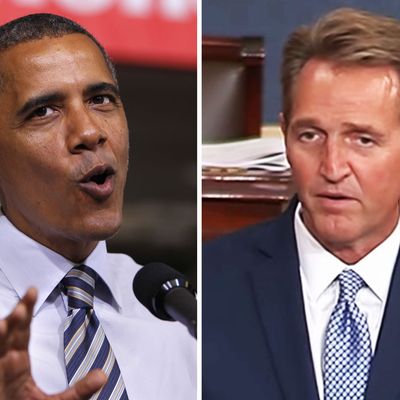
I’m probably not the only one who had a sense of déjà vu when Jeff Flake deployed a certain medical term in an interview yesterday:
After the senator from Arizona announced he was retiring because he couldn’t win a primary in President Trump’s Republican Party, Tapper asked: Why not make the case for why Trumpism is bad and let GOP voters decide?
“I think that this fever will break,” Flake said. “I don’t know that it’ll break by next year.”
During his 2012 reelection campaign, President Obama frequently referred to the extremism and obstructionism that had gripped the Republican Party since he took office in the same terms, as on this occasion during a speech in Minneapolis:
“I believe that if we’re successful in this election, when we’re successful in this election, that the fever may break, because there’s a tradition in the Republican Party of more common sense than that. My hope, my expectation, is that after the election, now that it turns out that the goal of beating Obama doesn’t make much sense because I’m not running again, that we can start getting some cooperation again,” Obama said.
Needless to say, that didn’t happen. After two more years of obstruction following the 2012 election, Republicans took back full control of Congress, and then wielded that power with a monomaniacal focus on seizing total power in 2016. To the extent that they did much of anything, it involved passing legislation they knew Obama would veto, to score ideological points and try to convince their “base” they’d tear up Obama’s legacy instantly if given the chance.
But the “fever” Republicans regularly fed to keep their activists, donors, and most committed voters revved up and howling at the moon got out of control. Out of the fever swamps emerged Donald Trump.
As Aaron Blake notes in a critique of Flake’s position, for all the peculiarities surrounding Trump, there’s less discontinuity with the recent past than some imagine:
Trump has certainly taken the GOP in a wholly new direction on a few issues, especially trade. But the things that really define him and separate him from other Republicans — attacking basically any establishment politician, fighting culture wars that most Republicans steer clear of, shunning all forms of political correctness — have been in demand among the GOP base for the better part of the past decade or more.
We’ll never know what might have happened to the Republican Party had Trump lost, as nearly everyone outside his immediate orbit (and some within it) expected. But for now, the raging debate within the GOP is not one between dissenters like Flake, McCain, and Corker (the “Last Hurrah Caucus” as Perry Bacon Jr. calls it) and Team Trump. It’s between the vast majority of Republican elected officials who have pledged fealty to Trump and those in the Republican base who believe that fealty is not passionate enough.
Symbolically, the fight echoes the one we just saw in Alabama between Luther Strange, the 1000-percent right-wing senator who could not utter a breath without singing a hymn of praise to Donald Trump, and Roy Moore, who embraced a more systematic radicalism aimed at Establishment Republicans who talked the talk but did not walk the walk of blowing up every conceivable limitation on full and immediate implementation of Trump’s agenda.
The GOP’s electoral base may determine the outcome of the fight between pro-Trump Establishmentarians and pro-Trump insurgents in a series of 2018 primaries. No matter who wins, though, it’s Trump’s party and “the fever” continues to rage. There’s no particular reason to assume it will burn itself out anytime soon.






























